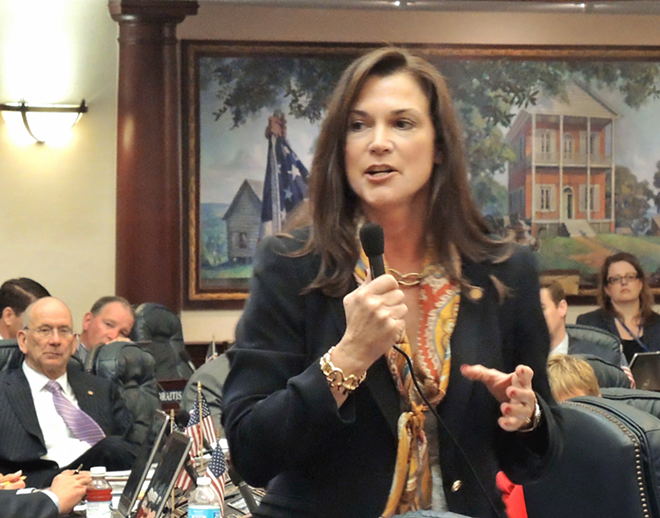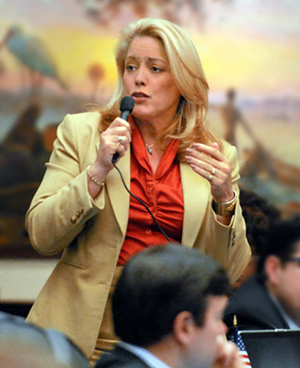
For a state with an economy that relies on a pristine environment, Florida sure has a lot of people who support using highly pressurized water, acid and sand to crack miles into the Earth’s crust in pursuit of fossil fuels.
For years now, state lawmakers have been weighing a bill aimed at regulating hydraulic fracturing — fracking, as it’s commonly known — while barring cities and counties from imposing local bans (or locally allowing the practice).
Such a bill has been filed during previous legislative sessions, though pressure from environmental groups has caused it to die in committee before. After all, fracking literally cracks open the earth, sometimes using poisonous chemicals (and Florida’s precious yet dwindling water supply), and storing hazardous waste products underground (near said precious water supply).
But there are rumblings that the bill will be coming up again in the 2017 session.
Environmental groups worry that the Republican majority in the State House and Senate make for a favorable climate for such a bill to pass (the fact that it hasn’t passed in prior years notwithstanding), even if the general public — those who understand what fracking is and how it could hurt the environment, public health and economy, anyway — opposes it.
That means Republicans running in swing districts have been put on the defensive over why they’ve been in support of the bill, while environmental advocates say they can’t have it both ways.
In the Tampa Bay area, two Republicans who have in the past supported controversial pro-fracking bills say they oppose the actual practice.
Their apparent reasoning?
Last year’s pro-fracking bill included a moratorium on the practice until its potential environmental impacts on the state were studied, something Republicans who claim to be anti-fracking say satisfied them.
“The only bill [banning fracking] that came before me is that one,” said State Rep. Kathleen Peters, R-South Pasadena, in a phone interview.

A Hollywood Democrat, Evan Jenne, had filed a bill during the last session that was an all-out ban on the practice; it didn’t get picked up by one committee, nor did it have a single Republican co-sponsor. The same goes for a similar bill filed in the State Senate by Orlando Democrat Darren Soto, as well as for two measures that would have placed a referendum for a fracking ban on a statewide ballot.
Peters said that if the study recommended lifting the moratorium, it would take legislative action to get that done — something she doubts would happen, and hopes does not.
“Quite frankly, I want to see that moratorium across the board,” she said. “That way we don’t have to worry about it. That’s what I want to see and that’s what that bill gave us, at least for the time being.”
David Cullen, a lobbyist for Sierra Club of Florida, said the language of the bill pertaining to both the study and the moratorium is referring to one type of fracking, high-pressure well stimulation, which isn’t the method the oil and gas industry would likely use. That would be acid matrix stimulation, which uses an acidic solution to bore through the state’s limestone-and-dolomite geology.
Furthermore, regulations for multiple types of fracking methods — and disposal of potentially hazardous waste materials — are already on the books. Cullen points to Division 62C of the Florida Administrative Code, which mentions both types of practices among those regulated (but “poorly” so, Cullen notes) in the state.
So it’s possible that while a ban on one type of fracking goes firmly into place, another may go on unchecked — which doesn’t make for much of a ban at all, he said.
“Saying that they supported the bill because they wanted to to stop fracking is in my mind disingenuous,” Cullen said.
Peters is facing a tough challenge from Democrat Jennifer Webb for her House District 69 seat, a swing seat previously held by St. Pete Mayor Rick Kriseman, a Democrat. The area includes the south Pinellas Beaches, Gulfport, South Pasadena and parts of south and west St. Pete. It’s largely coastal, and residents there tend to care deeply about environmental issues like offshore drilling and rampant development.
Webb has said she strongly opposes any measure that would open up the state to fracking.
A similar dynamic is playing out across the bay in the race for Florida’s newly drawn State Senate District 18 seat, where State Rep. Dana Young, R-Tampa, faces three challengers: Democrat Bob Buesing and non-party candidates Joe Redner and Sheldon Upthegrove.
Young has also said she opposes fracking, yet she supports passage of the bill that would “regulate” it in Florida. And the ban on local governments creating fracking ordinances doesn’t just apply to cities and counties that want to outlaw the practice, but to those that want to make it legal as well (such as Santa Rosa County, where it’s already taking place), she has said.
The progressive political action committee Florida Strong, which has been doggedly going after Young over her various positions, criticized her for what appears to some to be cognitive dissonance.
“State Rep. Dana Young is shamelessly trying to mislead her constituents on her dangerous anti-environment record,” the group said in an emailed statement. “Young has voted repeatedly for fracking, giving polluters the green light to use toxic chemicals in our land and water without notifying local residents. She even voted against a measure that would have banned the use of carcinogenic chemicals in fracking. Young’s record has put our drinking water at risk, and now she’s trying to avoid getting blamed. Tampa deserves better.”

